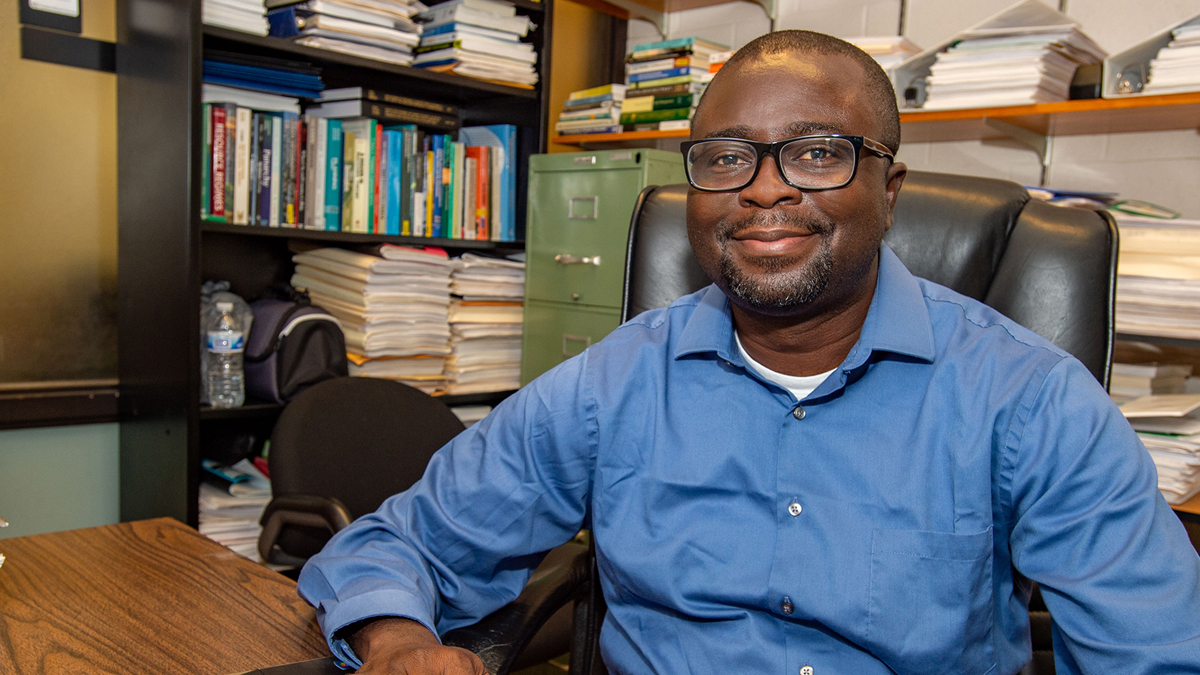
Kofi Akamani, associate professor in the School of Agricultural Sciences, will help write a chapter on ecosystems for the Fifth National Climate Assessment. The report evaluates the impacts of climate change on human and natural systems in the United States and is the government’s premier report on climate change impacts, risks and adaptation across the nation. (Photo by Russell Bailey)
September 29, 2021
SIU professor contributes to congressional climate change report
CARBONDALE, Ill. – A researcher at Southern Illinois University Carbondale will play an important role in an upcoming report on climate change commissioned by the U.S. Congress.
Kofi Akamani, associate professor in the School of Agricultural Sciences, will help write a chapter on ecosystems for the Fifth National Climate Assessment (NCA5). The report evaluates the impacts of climate change on human and natural systems in the United States and is the government’s premier report on climate change impacts, risks and adaptation across the nation. It is a congressionally mandated, interagency effort that brings together hundreds of experts from federal, state, and local governments, as well as the academic, nonprofit and private sectors.
The report is organized by the U.S. Global Change Research Program, a federal program mandated by Congress to coordinate federal research and investments in understanding the forces shaping the global environment, both human and natural, and such impacts on society.
The group facilitates collaboration and cooperation across its 13 federal member agencies to advance understanding of the changing Earth system and maximize efficiencies in federal global change research.
Akamani was invited to join the team of authors on the ecosystems chapter based on his work in the area of adaptive governance of forests and water resources, both in the United States and internationally, said Pamela McElwee, leader of the ecosystems chapter in the report. Allison Crimmons, director of NCA5, said Akamani’s experience and skillset made him an ideal participant in the report development process.
“Your selection as an author is a testament to your expertise in the field and standing among your peers,” Crimmons said. “I am confident that the experience you are bringing to your author team will elevate the quality of your chapter and NCA5 as a whole.”
Akamani said the ways that resource management professionals work with government to manage forests and water resources is evolving into a more comprehensive approach that recognizes the dynamic interdependence between humans and nature and the uncertainties that characterize these interactions.
“These insights have triggered the emergence of alternative management approaches, such as ecosystem management and adaptive governance,” Akamani said.
The goal of ecosystem management is to maintain the capacity to adapt while providing the goods and services on which humans depend. At the same time, adaptive governance provides an institutional mechanism for implementing those policies.
“Adaptive governance relies on flexible institutional mechanisms that connect stakeholders across multiple levels, including government agencies, communities and the private sector,” he said. “It also promotes decision-making processes that facilitate the management of conflicting stakeholder values and knowledge uncertainties.”
Akamani has conducted research in the U.S. and Ghana that is aimed at clarifying the key features of adaptive governance, the barriers and enabling conditions for its implementation, and the potential outcomes associated with it.
The research is directly relevant to the climate change discussion, Akamani said. In its latest report released in August 2021, the Intergovernmental Panel on Climate Change (IPCC) highlighted the potential risks posed by climate change to ecosystems and societies around the world and the urgent need for actions aimed at mitigating the causes and adapting to the impacts of global warming. The consequences of increased temperatures will include an increase in the frequency and intensity of floods, drought and other impacts.
“Given the accumulating evidence on global warming and its effects on the increased frequency and intensity of extreme weather events, the need to build society’s capacity for adaptation to these impacts is becoming a policy priority,” Akamani said. “The report I will be contributing to is coming at a critical time and provides an opportunity for using science to inform policies aimed at averting catastrophic impacts from global warming in the U.S. and elsewhere.”
Akamani said SIU helped him become an expert in his field of study, which led to his invitation to participate in NCA5.
“Since joining the forestry program here, I have had the opportunity to work with a lot of excellent colleagues and graduate students in pursuing my research agenda,” he said. “After years of hard work, it is an honor and a privilege to be called upon to contribute to such an important report.”
